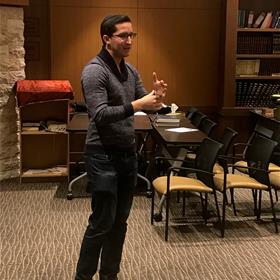Mental health advocate Marc Fein leads wellness workshop at Rutgers Hillel

Am I valuable? Am I worthy? Am I enough?
These questions often underpin people’s experience in society, where they are conditioned to base their value on external accomplishments. Over 50 Jewish students took a step back Tuesday night to look inward, gathering at Rutgers University Hillel for a mental health workshop led by renowned Jewish educator and mental health advocate Marc Fein.
In his interactive presentation titled “Living Beyond the Diagnosis,” Fein lifted the veil of mental illness by speaking about his experience living with depression and teaching how we can support ourselves and our friends.
“When I share my story, it empowers individuals to ask for support,” Fein said. “So many people are suffering in silence, and I strive to open up the dialogue and teach how we can best create a caring and inclusive community.”
Fein took students back to his school days to highlight the stark difference between one’s external and internal reality. His resume topped the charts — 99th percentile on the SAT, Advanced Placement National Scholar, captain of the debate team, editor of the college paper. And the list goes on.
His internal reality, however, was far different.
“I had outsourced all of my value to my achievements,” Fein said. “Eventually, I got to the point where I put on so many masks for other people that I didn’t know who I was anymore.”
Fein shared examples of anxiety spirals, verbalizing negative thought patterns that are typically never spoken out loud. He also described the various self-numbing tactics people use to avoid acknowledging emotions, which range from alcohol to obsessive exercise and work. Finally, he described his journey to recovery though medication and therapy.
Despite its serious subject matter, the talk was peppered with humor and hope. Fein sought to inspire openness and empower individuals to reach out for help.
“Asking for support does not come from a place of weakness,” he said. “It comes from a place of strength. You’re saying ‘I matter, I’m worthy. Therefore, I want my life to be different.’”
Fein encouraged students to truly be there for one another, noticing when people’s baseline behaviors shift and having the courage to ask how they are doing.
He also emphasized the importance of self-care. “When you are putting together your calendars, are you putting in a slot for taking care of yourself?” he asked.
Fein said each person must figure out how to best refuel. For some, it might be music. For others, it may be meditation. Perhaps it’s simply calling a friend. The crucial element is for people to recognize their inherent worth and take the time to support themselves.
“Marc Fein was one of the most real and honest speakers we’ve ever had speak at Hillel,” said Netanel Shedlo, a sophomore civil engineering major. “He managed to increase our awareness of such a relevant issue while still keeping it light, humorous and engaging.”
This sentiment was shared by many other participants, including Gilana Levavi, a senior majoring in religion and philosophy. She said that Fein’s advocacy has sparked conversations that play a key role in building pluralistic communities.
“Rutgers Hillel should strive to be a community where students can express their full selves — including aspects of themselves that are impacted by mental illness — and a community in which students value and learn from the diverse experiences of one another with compassion, empathy and support,” Levavi said.
She added that Fein’s talk reemphasized the importance of her own mental health work on campus. Levavi, who heads the Project to Promote Mental Health Dialogue at Rutgers Hillel, is helping organize an interfaith mental health dialogue in mid-April that will include student panelists of varying religions and worldviews.
Andrew Getraer, executive director of Rutgers Hillel, was also moved by Fein’s talk.
“There was not a person in the room, including myself, who couldn’t relate to Marc’s story in some way,” Getraer said. “And this program is just the beginning of Rutgers Hillel’s mission to support the mental and emotional health of our students.”
Beginning in September, Rutgers Hillel will partner with the University Counseling and Psychological Services to provide a counseling professional in the Hillel building. Apart from leading educational programs, the professional will also offer personal and group counseling.
Getraer said, “If we truly love and care about our students — and I know we do — this is our communal responsibility.”